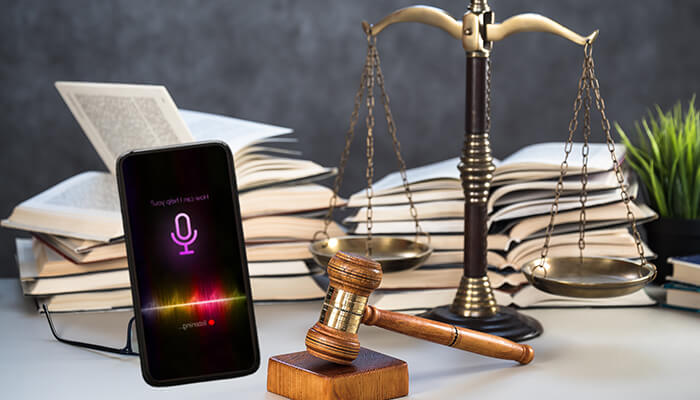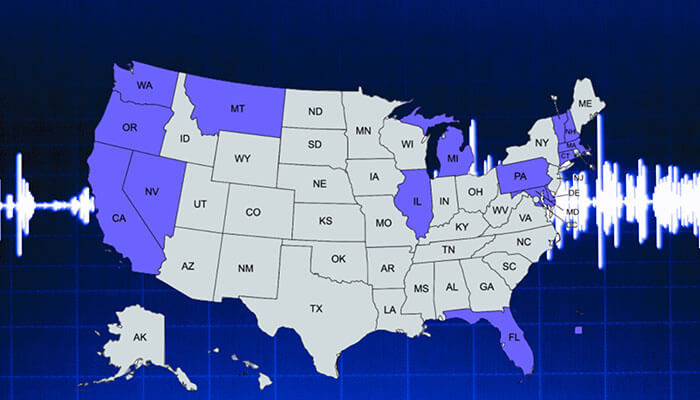While it is very uncommon, that you may occasionally feel a need to record phone calls or face-to-face conversations. Sometimes you would like to collect the proof to show the police that your child is being abused over the phone. Possibly you are looking for evidence of an affair or illegal activity to move on with a divorce. Perhaps you want to record the conversations you have with creditors. You might not think twice about pushing a record on your mobile app or recording device, but did you know that what you’re doing could be against the law? Each state has its own regulations regarding call recording. As you know, there are one party vs two party consent states which are explained in this article. Call recording laws by states differ from each other.
What does One Party Consent Mean?
With one-party consent, one person can record conversations they participate in without the other person’s consent. Although there may be minor distinctions, you should still be sure to review each state’s individual laws. According to a general rule for one-party consent, if you are a part of the conversation, you are allowed to record it.
One Party Consent States:
Despite being one-party consent states, there may be small variations between federal and state laws that allow the recording of conversations. Click through each state to see a more detailed version of the Recording Laws or scroll down for a brief state-by-state overview. As far as one-party consent states are 37 states (+DC). Furthermore, Connecticut may also be considered a one-party consent state at times.
The list of one party consent states includes Georgia, Hawaii, Idaho, Indiana, Iowa, Kansas, Kentucky, Louisiana, Maine, Minnesota, Mississippi, Missouri*, Nebraska, Nevada, New Jersey, New Mexico, New York, North Carolina, North Dakota, Ohio, Oklahoma, Rhode Island, South Carolina, South Dakota, Tennessee, Texas, Utah, Vermont, Virginia, West Virginia, Wisconsin, and Wyoming
RecordingLaw.com prefers to stay cautious, because of the unique provisions in some states. Federal law is applicable because Vermont lacks an established law related to call recording. As a result, Vermont becomes a one-party consent state.
How Does the Law of One Party Consent apply?
It is interesting to note that audio recordings are much stricter and have more established rules than video recordings. This means there is far less legal red tape around surveillance and other audio-free videos. However, the following are among the devices that are subjected to the law that applies on oral communication, telephone calls, conference calls, electronic communications, and third-party interception.
What does Two Party Consent mean?
Even if there are more than two parties, all of them must agree to the recording under two-party consent laws. By doing this, you can avoid secretly recording someone. It is crucial to remember that based on the state in which you are recording, different laws may apply to recording police officers or other public officials.
Two Party Consent States:
In two-party (or all-party) consent states, state law requires that all participants in a conversation must have granted their approval for the conversation to be recorded when there is an expectation of privacy. This law applies to both public and private places, consent is needed if privacy is expected. Generally speaking, you can record a video in a public place as long as you make sure that the individuals who are conversing are speaking in a public place and that the audio and subject of the conversation are recorded. For more details, check the specific recording laws in your state.
RecordingLaw.com prefers to be cautious because they have unique laws that could be examined differently in each circumstance. As per April 2023, there are 11 states with two-party consent laws.
The following states are:
California, Delaware, Florida, Illinois, Maryland, Massachusetts, Michigan, Montana, New Hampshire, Pennsylvania, Washington.
How do you obtain permission to record a discussion in which you are not part of
You have the right to record a conversation in any situation where there is no realistic expectation of privacy. Examples of this would be in a popular cafe (where you got the permission to record) or a public park or building. Obtaining affirmative consent is recommended, when recording a conversation that takes place in a private place like a person’s home.
You can gain consent on the parties involved by:
1. Obtaining written or verbal consent before recording is one way to obtain the parties’ consent.
2. A verbal notification is being played, before the phone conversation starts.
3. At regular intervals throughout the conversation, an audible beep tone is repeated.
How can you Transcribe an Audio Recording
Audio transcription can be done in many ways. You have three possibilities: employ an audio transcription service, hire someone to do it, or do it yourself in a word document. We recommend using transcription service as it combines the cost-effectiveness of AI with the accuracy of humans. The turnaround time is 12 hours, if privacy is important you can have them sign a standard NDA.
Conclusion:
I hope this article helps you in knowing the difference between one party consent states and two party consent states. The laws for call recording may vary from one state to another. One can follow the laws of their state and proceed accordingly.
FAQ’s:
Q1. Can I legally record law enforcement officers in a one party consent state?
Ans. Yes! The first amendment gives you the right to record police officers while they are performing their official duties. Your pictures, videos, and audio recordings cannot be deleted by a police officer. You should be aware that, even while you DO have the right to record law enforcement, this does not, legally speaking, grant you the right to break other laws (the most common being trespassing or obstruction).
Q2. Can I record public officials?
Ans. The ability to record a public official while they are carrying out their duties is typically regarded as a first amendment right. Note: You should check your local legislation as this does not apply to courthouses.





